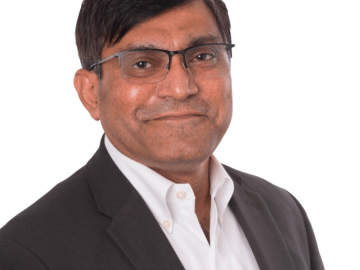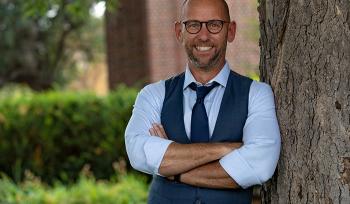COBE Alum: Zia Karim, Ph.D.
Zia Karim, Ph.D. completed his Certificate of Business Excellence (COBE) from UC Berkeley Executive Education in 2019. He currently owns 17 patents and has authored more than 40 papers in peer-reviewed journals. With 28 years of experience in the semiconductor and compound semiconductor fabrication and capital equipment business, Zia also boasts an extensive background in sales and marketing, technology management, business development, and product management/positioning. He currently serves as the Chief Technology Officer at Yield Engineering Systems (YES), a leading manufacturer of process equipment for semiconductor advanced packaging and life sciences, in Fremont, California.
Two years later, the benefits have been far-reaching
“There have been numerous lasting benefits from earning my COBE. They include setting up a winning culture, managing my emotional intelligence in a flourishing and fast-moving post-Covid business situation, encouraging an innovative environment, and establishing a successful product and technology strategy.”
Since completing his COBE, Zia says, “My company has grown by ten times, with a threefold increase in revenue, thanks to strategy execution through a winning culture. I have also been able to increase my listening skills and demonstrate greater empathy toward others and their opinions. The growth of my emotional intelligence has been profound.”
Founded in 1980, YES for many years was a small, R&D-oriented business making lab tools. After it was acquired in 2018, Zia, along with the new leadership team, led the effort to change and establish a winning and growth culture for the organization. He attributes his overwhelming success in doing so to his Executive Education experience.
Zia’s path to UC Executive Education
Zia moved to the U.S. in 1993 after completing his Ph.D. in Electrical Engineering at Dublin City University (DCU), Ireland, and his B.Sc./M.Sc. in EE from Bangladesh University of Engineering and Technology (BUET). Through his research collaborations and spending a lot of time on the UC Berkeley campus with the electrical and mechanical engineering departments, he had heard about Executive Education. Then, when it was time to take his career to the next level as a corporate executive, Zia turned to Exec Ed for help.
About his first program, Berkeley Executive Leadership Program, Zia says the program had a lasting impact on his leadership style. “I still go through the materials related to ‘creating a high-performance culture’ or ‘lead change and drive innovation.’ Our company went through very fast growth – and leading change and maintaining an Innovative culture, with strong strategic planning, was critical,” says Zia. He also says that the Executive Leadership Program helped Zia to establish a vision, mission, and goal for the whole organization, in partnership with the leadership team. That vision, mission, and goal has now become well-established and is integral to the company’s culture.
“This is the most impressive and effective program I attended – and it’s had the longest-range effect for me,” he says.
In Zia’s second program, The Innovative Organization, Zia learned the fundamentals of organizational profitability and growth – and the importance of maintaining the right environment in order for the company to profit and grow.
“In the high-growth environment – while simultaneously focusing on current products and current customers – it’s imperative to establish an innovative culture throughout the company. This program showed me the way. My company’s objective was to nurture and encourage innovation. With that objective, we were able to drive innovation to contribute immensely to future growth. By establishing an innovative organization, we have seen an increase of ideas, solutions, and product differentiation for our business,” he says.
In the Leading High-Performance Culture program, Zia learned the basis of how to set up a company culture. “I learned about the different types of cultures – there are five types – and how to match the appropriate type to an organization. I learned how to be effective in maintaining the culture and connecting it to the business, which ultimately shows in the bottom line.”
According to Zia, the Financial Data Analysis for Leaders program proved very helpful in increasing his financial knowledge. “As a technical and marketing expert, I found this program very helpful, touching on aspects outside my normal expertise. I learned the methods for calculating money in and out, and gained a deeper understanding of how the financial system works overall.” Zia says that because of the program, he now clearly understands revenue, product cost, directional movement index (or DMI) – the direction the price of an asset is moving – and how to calculate profit.
Next up was Negotiation and Influence. Zia says this program helped him to adjust his approach for better outcomes. “This program helped me increase my emotional intelligence. I used to be very direct. But the program taught me the value and importance of give and take, and how to present my case in different, positive ways, adapting to others. I learned how to influence and encourage others and what it means to build influence – with practical application. Now when I interact with my colleagues or groups, I know how to negotiate and have influence. Since completing this program, my outcomes and the results have been much better!”
Most profound outcome
“For me, the growth of my emotional intelligence was profound. It led me to change my mindset, and set me up for broader performance. I used to be very direct, and now I am able to modify myself when necessary and appropriate – I apply an intelligence to my responses and interactions, show empathy to others, and accept differing opinions.”
The COBE experience also elevated Zia’s leadership style. “I was a solid technical contributor, but with my COBE, I am now able to successfully lead. It has positioned me for leadership – and being able to lead with effective performance. My COBE really helped move me from a limited area of expertise to a much bigger area of leadership performance.”



